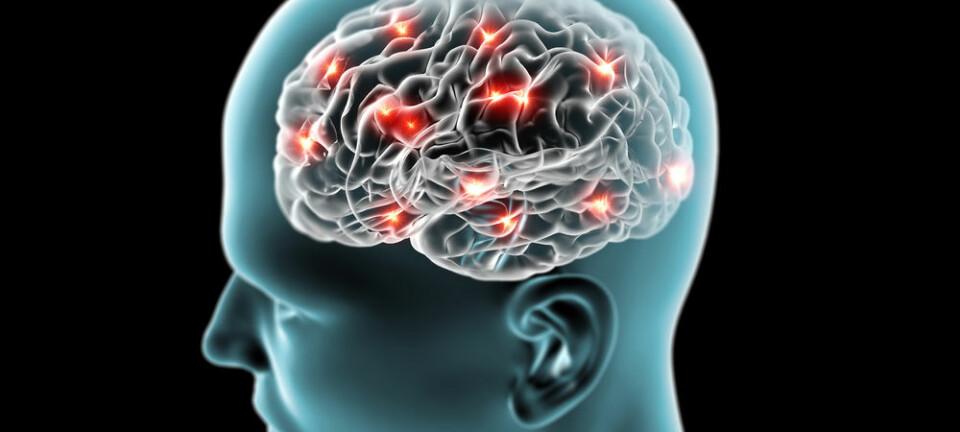
Parkinson's disease may start in the Stomach
New study shows Parkinson's disease begins in the gut and creeps up the vagus nerve to the brain, offering hope for new treatments
"It's a fantastic experience to attend a conference in the US among world-leading scientists in Parkinson's disease and see that they are really excited about your research. It gives us hope that our work will help to make a difference," says Elisabeth Svensson, a post-doc from the Department of Clinical Medicine at Aarhus University in Denmark.
She is the lead scientist in a new study just published in the journal Annals of Neurology, suggesting that the vagus nerve -- which connects the brain with the abdominal tract -- may transport Parkinson's disease from the stomach up into the brain. If the nerve is severed early, the occurrence of Parkinson's can be halved.
According to Svensson, whilst they are still unsure how Parkinson's starts in the gut, this is the first direct evidence that the vagus nerve is involved in the development of the disease in humans.
"It may bring us one step closer to understanding how Parkinson's develops," says Svensson.
First symptom is constipation
The new study is extremely important and may settle an on-going dispute amongst scientists studying Parkinson's disease, according to Per Borghammer, an assistant professor at the Department of Clinical Medicine at Aarhus University in Denmark, and a co-author of the new study.
"A good number of scientists have doubted that the disease could be transmitted from the gut, even though several studies of animals have suggested this. But now we have outright evidence that the vagus nerve is involved in development of the disease in humans," says Borghammer.
"We hope that this suppresses doubts over whether or not Parkinson’s can start in the stomach, and that more money can be focussed into funding research to look at why the disorder starts here," he says.
It has long been known that Parkinson's patients often suffer constipation several years before the typical symptoms of the disease appear -- such as shaking, reduced mobility and even depression.
Last year a group of scientists led by Borghammer showed, using a new PET scanning technique, that Parkinson's patients have fewer nerve connections in the stomach than healthy people. This indicates that Parkinson's disease doesn't just kill brain cells but also the nerve connections between the brain and the gut.
Disease may stem from the gut in every case
The new study looked at over 10,000 patients who had their vagus nerves severed in the 1970s and 1980s as part of a cure for stomach ulcers.
Approximately half the patients had had the nerve severed completely, in a process called a vagotomy, whilst in the other half of patients it was only partly severed.
The scientists investigated how many of these patients developed Parkinson's and compared this with the occurrence of Parkinson's in a control group of more than 100,000 people who had an intact vagus nerve.
They saw that patients with a completely severed vagus nerve experienced 50 per cent fewer occurrences of Parkinson's disease than the control group.
On the other hand, the group of patients with a partially severed nerve developed Parkinson's at the same rate as the control group.
This suggests that the nerve has to be completely severed to reduce the risk of the disease spreading from the abdomen.
"We can see that partial severing of the nerve doesn't help reduce the risk of developing the disease. The disease would then still be able to spread from cell to cell until it reached the brain," says Svensson.
"But it seems that patients who had their vagotomy earlier in life were less likely to develop Parkinson's," she says.
Can Parkinson's be contracted through the nose?
The question now, according to Borghammer, is how many people develop the disorder if they undergo a vagotomy early enough.
"We don't yet know whether Parkinson's always develops in the stomach or whether it can also arise in other ways. One of the other popular explanations is that the disease can be contracted through the mucous membranes of the nose and then via the olfactory nerve," says Borghammer.
He also emphasises that the long-term consequences of severing the vagus nerve are not yet known.
Scientists still do not know what exactly triggers Parkinson's, but they are considering whether it is something in our food or environment that gets into our noses or our stomachs and then infects the cells.
It is also possible that Parkinson's may be reminiscent of mad cow disease (BSE) - which develops in the brains of cattle and can also infect humans who eat BSE infected meat.
Result is one piece of the larger puzzle
Kristian Winge, a clinical associate research professor in the Department of Clinical Medicine at the University of Copenhagen, Denmark, has read the study and describes it as an important piece in a much larger jigsaw.
According to Winge, whilst the new study is interesting, it only finds a statistical connection between people with severed vagus nerves and the development of Parkinson's disease -- It does not identify the actual mechanism involved.
"Several things change in the body when you undergo a vagotomy. So, in principle there could be several causal explanations as to why this group of patients doesn't get Parkinson's to the same extent as the other groups,” he says.
“But if you look at the overall research picture, there is a lot to indicate that the stomach and the vagus nerve constitute significant routes of infection,” says Winge.
According to him, the next step is to find an indicator of when changes begin to occur in the nerve cells of the stomach.
"There are still many gaps in our knowledge of Parkinson's disease. For example, we have to find out precisely how a diseased Parkinson's cell infects another healthy nerve cell. We must also ascertain how many Parkinson's patients developed the disorder in their abdominal tract and what actually triggers the disease in the first place," Says Winge.
--------------
Read the Danish version of this article on Videnskab.dk
Translated by: Hugh Matthews











